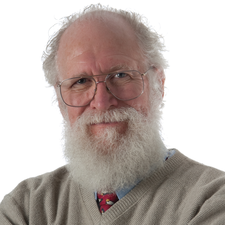Shoulders to Stand On
Doghouse – Courage and Imagination

maddog calls for courage and imagination to overcome our prejudices and address the world's perplexing problems.
Today I received news that Katherine Johnson, a NASA mathematician who performed many of the calculations used by the space program to put people on the moon, has died at the age of 101.
For those of you who did not see the movie Hidden Figures, Ms. Johnson had to fight against both racial and sexual discrimination to have her work accepted in the white male-dominated climate of that day.
I was born in Baltimore, Maryland, in 1950. I saw the "white persons water fountain," the "white persons lunch counter," and the signs that told black people to go to the back of the bus. Even many of our religious leaders told us that the white race needed to "take care of our black brothers and sisters." With all the prejudices that were present at that time, we can appreciate Katherine Johnson's contribution all the more knowing the obstacles she had to overcome. We can also see how the space program benefited from her presence.
[...]
Buy this article as PDF
(incl. VAT)
Buy Linux Magazine
Subscribe to our Linux Newsletters
Find Linux and Open Source Jobs
Subscribe to our ADMIN Newsletters
Support Our Work
Linux Magazine content is made possible with support from readers like you. Please consider contributing when you’ve found an article to be beneficial.

News
-
Keep Android Open
Google has announced that, soon, anyone looking to develop Android apps will have to first register centrally with Google.
-
Kernel 7.0 Now in Testing
Linus Torvalds has announced the first Release Candidate (RC) for the 7.x kernel is available for those who want to test it.
-
Introducing matrixOS, an Immutable Gentoo-Based Linux Distro
It was only a matter of time before a developer decided one of the most challenging Linux distributions needed to be immutable.
-
Chaos Comes to KDE in KaOS
KaOS devs are making a major change to the distribution, and it all comes down to one system.
-
New Linux Botnet Discovered
The SSHStalker botnet uses IRC C2 to control systems via legacy Linux kernel exploits.
-
The Next Linux Kernel Turns 7.0
Linus Torvalds has announced that after Linux kernel 6.19, we'll finally reach the 7.0 iteration stage.
-
Linux From Scratch Drops SysVinit Support
LFS will no longer support SysVinit.
-
LibreOffice 26.2 Now Available
With new features, improvements, and bug fixes, LibreOffice 26.2 delivers a modern, polished office suite without compromise.
-
Linux Kernel Project Releases Project Continuity Document
What happens to Linux when there's no Linus? It's a question many of us have asked over the years, and it seems it's also on the minds of the Linux kernel project.
-
Mecha Systems Introduces Linux Handheld
Mecha Systems has revealed its Mecha Comet, a new handheld computer powered by – you guessed it – Linux.
